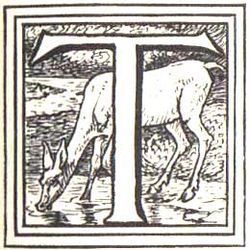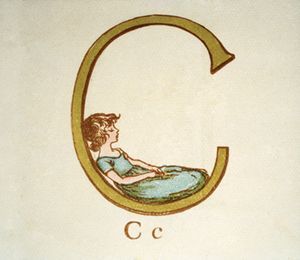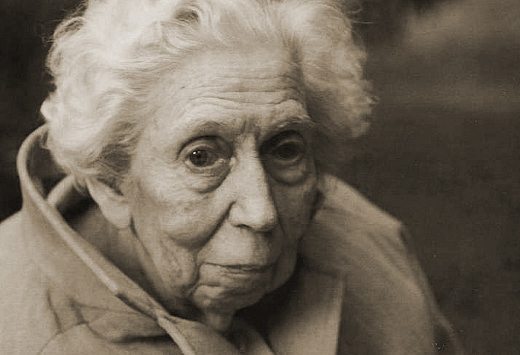The wizardry of words
From One Writer's Beginnings and On Writing by Eudora Welty:
“I live in gratitude to my parents for initiating me--and as early as I
begged for it, without keeping me waiting--into knowledge of the word,
into reading and spelling, by way of the alphabet. They taught it to me at home in time for me to begin to read before starting school. My
love for the alphabet,  which endures, grew out of reciting it but,
which endures, grew out of reciting it but,
before that, out of seeing the letters on the page. In my own story
books, before I could read them for myself I fell in love with various
winding, enchanted-looking initials drawn by Walter Crane at the head of
fairy tales. In 'Once upon a time,' an 'o' had a rabbit running it as a
treadmill, his feet upon flowers. When the day came years later for me
to see the Book of Kells, all the wizardry of letter, initial, and word
swept over me a thousand times, and the illumination, the gold, seemed a
part of the world's beauty and holiness that had been there from the
start.”
“It had been startling and
disappointing to me to find out that story books had been written by
people, that books were not natural wonders, coming up of themselves
like grass. Yet regardless of where they come from, I cannot remember
a time when I was not in love with them -- with the books themselves,
cover and binding and the paper they were printed on, with their
smell and their weight and with their possession in my arms, captured
and carried off to myself. Still illiterate, I was ready for them,
committed to all the reading I could give them.”
“I read library books as fast as I could go, rushing them home in
the basket of my bicycle. From the minute I reached our house, I started
to read. Every book I seized on, from Bunny Brown and His Sister Sue
at Camp Rest-a-While to Twenty Thousand Leagues Under the Sea, stood
for the devouring wish to read being instantly granted. I knew this was
bliss, knew it at the time. Taste isn’t nearly so important; it comes in
its own time.”
 “Long before I wrote stories, I
“Long before I wrote stories, I
listened for stories. Listening for them is something more acute than
listening to them. I suppose it’s an early form of participation in
what goes on. Listening children know stories are there. When their
elders sit and begin, children are just waiting and hoping for one to
come out, like a mouse from its hole.”
"Children, like animals use all their senses to discover the
world. Then artists come along and discover it the same way.... Or now
and then we'll hear from an artist who's never lost it.”
 "We do need to bring to our writing, over and over again, all the
"We do need to bring to our writing, over and over again, all the
abundance we possess. To be able, to be ready, to enter into the minds
and hearts of our own people, all of them, to comprehend them (us) and
then to make characters and plots in stories that in honesty and with
honesty reveal them (ourselves) to us, in whatever situation we live
through in our own times: this is the continuing job, and it's no harder
now than it ever was, I suppose. Every writer, like everybody else,
thinks he's living through the crisis of the ages.
"To write honestly and
with all our powers is the least we can do, and the most.”
Images above: A page from the Book of Kells (ca. 800), An Absurd ABC by Walter Crane (1845-1915), a decorative letter by Walter Crane (from the fairy tale Brother & Sister), two illustrations from A is for Apples by Kate Greenaway (1846-1901), letters designed by William Morris (1834-1896), and photographs of Eudora Welty (1909-2001) in youth and age.
And don't forget to sample the latest dishes in the Moveable Feasts, links to which can be found on the second page of comments for this post.
Terri Windling's Blog
- Terri Windling's profile
- 712 followers








